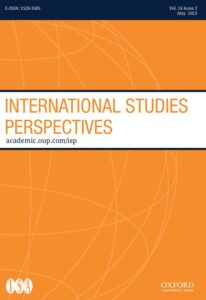
In this piece in International Studies Perspectives, my co-authors and I introduce the Legitimation Strategies of Regional Organizations (LegRO) dataset, which details how 28 regional organizations justify their authority with reference to normative standards as well as claims about the instantiation of these standards through policy, institutions, and behaviour (1980-2019).
Abstract
This article introduces a new dataset on how international organizations (IOs) justify their authority. For a long time, IOs were be- lieved to derive legitimacy from member-state consent and technocratic problem-solving capacities. Over recent decades, the growing politicization of IOs, political polarization within Western democracies, and power shifts in the international system have spurred IOs’ efforts to justify their right to rule, using a variety of legitimation practices. While research on the theory and practice of IO legitimation has grown considerably over the past decade, much of this work builds on case studies of prominent global and regional IOs. As a result, we lack data suitable for systematic comparative analyses across time, IOs, and world regions. The Legitimation Strategies of Regional Organizations (LegRO) dataset aims to narrow this gap, providing data on the standards, intensity, and modes of legitimation for twenty eight regional IOs from 1980 to 2019. These variables inform theoretical and policy-relevant research on contemporary global governance by providing the first systematic overview of IOs’ legitimation practices.
» Full article (open access)